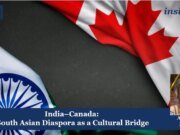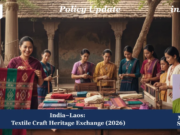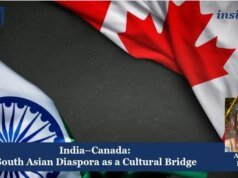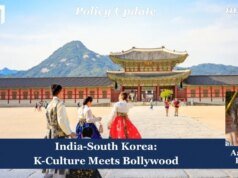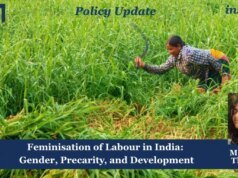Policy Update
Nomula Pranay Goud
Background:
India- Australia: Cricket and Cultural Diplomacy have a dynamic relationship in which culture serves as a diplomatic bridge. Cultural diplomacy between the two countries emphasizes how people to people, culture and soft power can help to build better bilateral relations. Cricket has become one of the most powerful unifying forces between India and Australia, and it has defined 70 years of sporting and cultural relations between the nations.
The first test tour to Australia by India was in the year 1947- 48 but this time an Indian named Lala Amarnath took on the challenge of playing against the Don Bradman team. Ever since then, games between the two countries have turned out to be highly competitive and popular.
Functions:
- Cultural diplomacy helps in closer contact between Australian society and Indian society. A bridge of friendship is the Indian diaspora in Australia (more than 1 million).
- The awareness is raised, and stereotypes decrease due to cultural exchanges, art festivals, films, yoga, and food festivals. As events such as the Diwali in Australia and the Australia Fest in India demonstrate, the traditions of both parties are on display.
- Long term relations are created through student exchanges and scholarships. Thousands of Indian students in Australia are informal cultural ambassadors.
- Australians visit India because of films, cricket, and yoga and India promotes its landscapes, art and literature in Australia. Improves tourism and the desire of people to learn more about the countries in which they live.
- Cultural diplomacy creates goodwill which promotes trade, strategic collaboration and diplomacy. It establishes a favorable atmosphere of political and economic consensus.
- Understands the cultural diversity of India and the multi-culturalism of Australia. Encourages global citizenship, inclusivity and respect.
Performance:
- The most conspicuous and successful kind of diplomacy between India and Australia is cricket. Cricket is a cultural bridge because matches are passionately followed in the two countries.
- Ever since the first Indian tour to Australia in 1947- 48, cricket has earned sporting respect. It has become one of the most prestigious Test series in the world today, the Border Gavaskar Trophy.
- In 2020-21, India won a series in Australia, which, along with a comeback victory in 2001 at Eden Gardens Test, improved the image of India internationally. Australia admires the rising cricketing power of India, and Indians adore the fighting spirit of the Austrians.
The partnership between the IPL (Indian Premier League) and the cricketing world has further strengthened the cricketing connections, as the cricketing world has seen players like David Warner, Pat Cummins, Glenn Maxwell among others becoming a household name in India. David Warner adopted Hyderabadi culture and even greets his telugu fans and celebrates festivals on the internet.
Warner played the role of a cultural intermediary, he was fond of Tollywood films and music, particularly the songs of Allu Arjun in Pushpa. Mutual respect, trust and success at Sunrisers Hyderabad is the key to the Bhuvneshwar-Warner bond. Whereas Warner was aggressive and full of panache, Bhuvi was disciplined and skilled. They both represented the golden age of SRH and are still well remembered by Hyderabad fans.

- Australia is home to over 1 million people of Indian origin and as a result, they are among the fastest-growing migrant groups. They celebrate Diwali, Holi, Navratri and make Indian food, yoga and films more multicultural. The Indian diaspora has become informal ambassadors that intensify the soft power of India.
- Australia Fest (2018-19): The Australian Government runs a big cultural festival throughout India with 75+ events (art, literature, food, films).
- Confluence Festival of India (2016): Indian music, dance and art finally found their way to the Australian cities. These kinds of festivals increase appreciation of traditions.
- Australia has over 100,000 Indian students who establish long-term cultural relationships. Research programs and academic cooperations contribute to people-to-people diplomacy.
- The two countries entered into agreements to facilitate cultural exchanges and heritage protection and collaboration in the creative sectors. High-level visits tend to focus on India-Australia cultural diplomacy.
Emerging issues:
- Players have tight schedules due to IPL, bilateral series and ICC tournaments. There is tension at times between BCCI and Cricket Australia (CA) regarding the dates of the tour or availability of the players.
- The Indian and Australian media tend to create controversies (umpiring errors, DRS calls, sledging) to form a nationalistic cricketing story. At times the conflict of social media fans increases the tension.
- IPL gives large contracts to Australian players and the debate in Australia is whether players are more interested in franchise cricket than national duty. Striking a balance between national and league commitments is not a new problem.
- Relationships are sometimes strained by aggressive on-field conduct (sledging, arguments with umpires), although there is now a higher sportsmanship standard. Still influencing the discussions are iconic controversies such as the so-called Monkeygate (2008 Sydney Test).


Source:https://www.cricindeed.com/changes-in-indian-cricket-since-captain-virat-kohli/548aa146a8ce7/
- Cultural events are occasionally overdone and become commercial. Cultural activity is overshadowed by commercial interest and glamor.
Example: Movie or food fairs with less emphasis on cultural exchange and more on glamour.
- India-Australia relations are associated with Quad and Indo-Pacific relations. Cultural diplomacy can sometimes be a tension between strategic or political differences.
- Indians of Australian origin (over 1 million people) form a community, but there are occasional challenges of integration, racism, and representation. It is a challenge to ensure their voices are incorporated in cultural diplomacy. As India has more than 100,000 Indian students in Australia, student safety, visa regulations and discrimination have an impact on cultural goodwill.
Way Forward:
- India can exploit its 1 million plus diaspora in Australia as a cultural ambassador. Hosting community-oriented events (Diwali, Holi, Yoga Day) under governmental patronage is worth creating goodwill in the long term.
- Rather than occasional events such as Australia fest or Confluence festival of India, a yearly cultural exchange program featuring cinema, literature, indigenous traditions and contemporary art should be held in both countries.
- Introduce Youth Forums between India and Australia to facilitate student mobility, shared research and language courses. The scholarships and cultural immersion programs will produce future cultural diplomats.
- There can be joint production of films, documentaries, and OTT content to enhance understanding between people. Positive stories can be created through social media campaigns that promote common wins by a team or cultural events.
- Permanent annual series (such as Ashes) between India and Australia–e.g., Friendship Trophy. Add T20 mixed-gender games that involve both men and women teams to attract more fans.
- Leverage IPL and BBL as cross-cultural learning platforms: coach and player exchange, and fan engagement programs.
References:
About the Contributor:
Nomula Pranay Goud, Master’s student in International Relations at Manipal University Jaipur, and a Research intern at Impact and Policy Research Institute (IMPRI).
Acknowledgement:
The author sincerely thanks Ms.Aasthaba Jadeja, Ms.Bhaktiba Jadeja and the IMPRI team for their valuable support.
Disclaimer:
All views expressed in the article belong to the author and not necessarily to the organisation.
Read more on IMPRI:
SCO and the Shifting Balance: China’s Bid to Shape Global Governance
Energy, Security, and Strategy: Why Central Asia Matters to India


